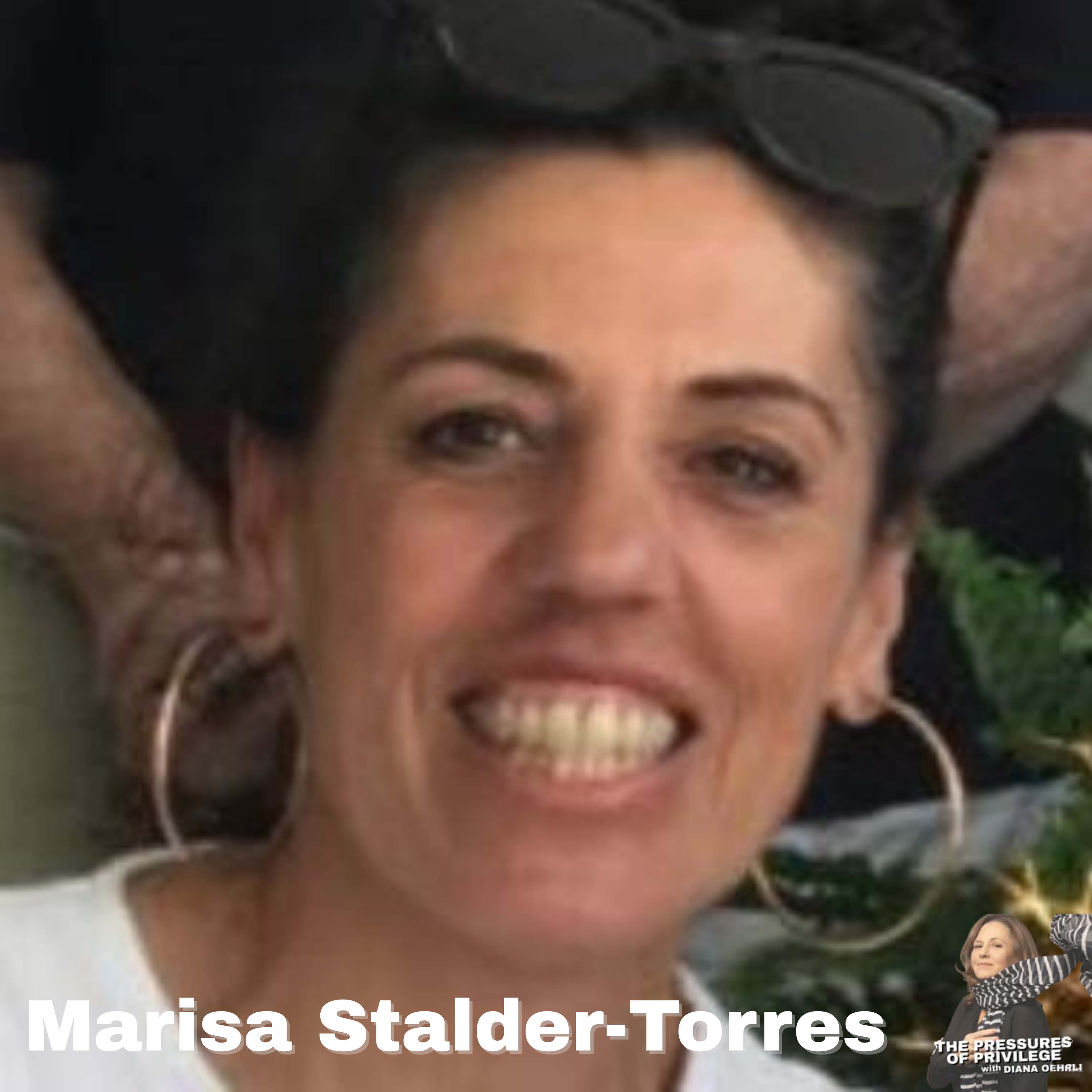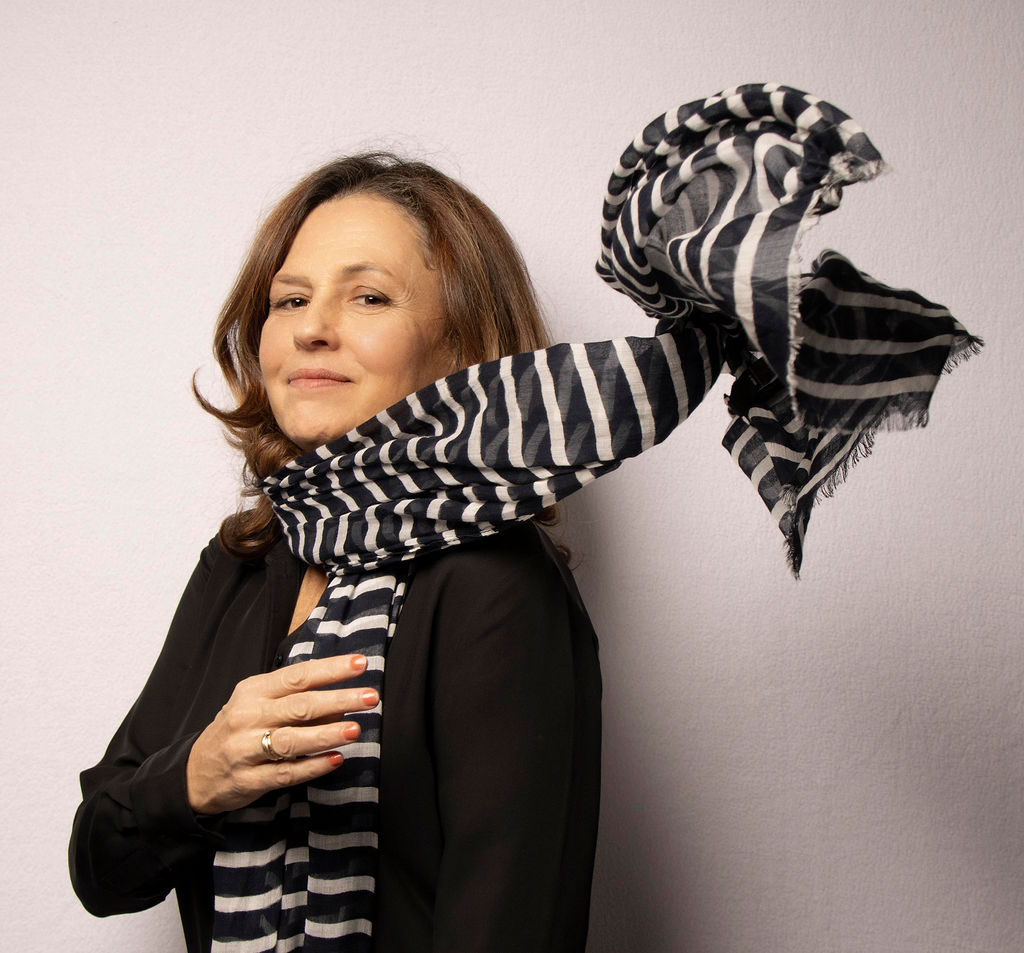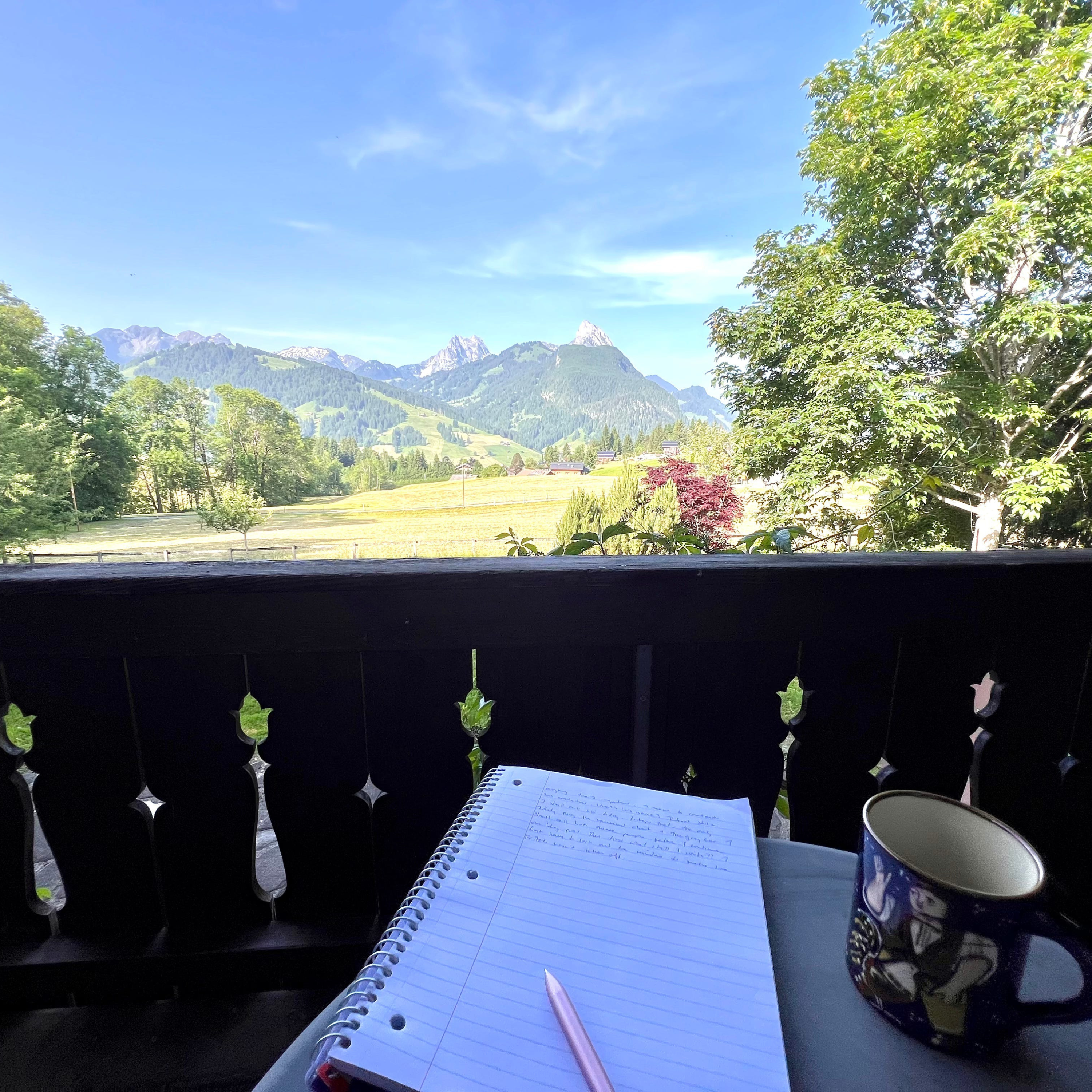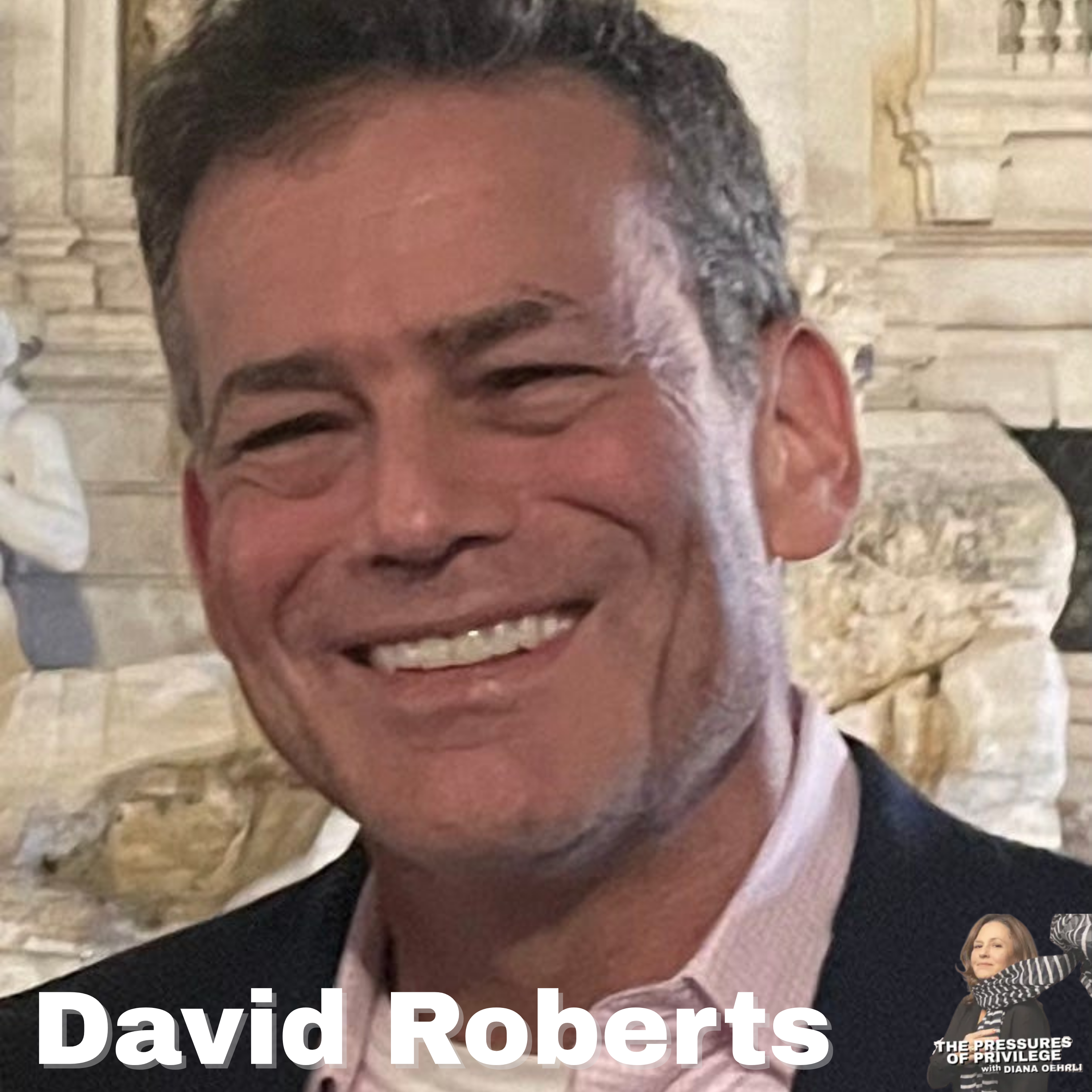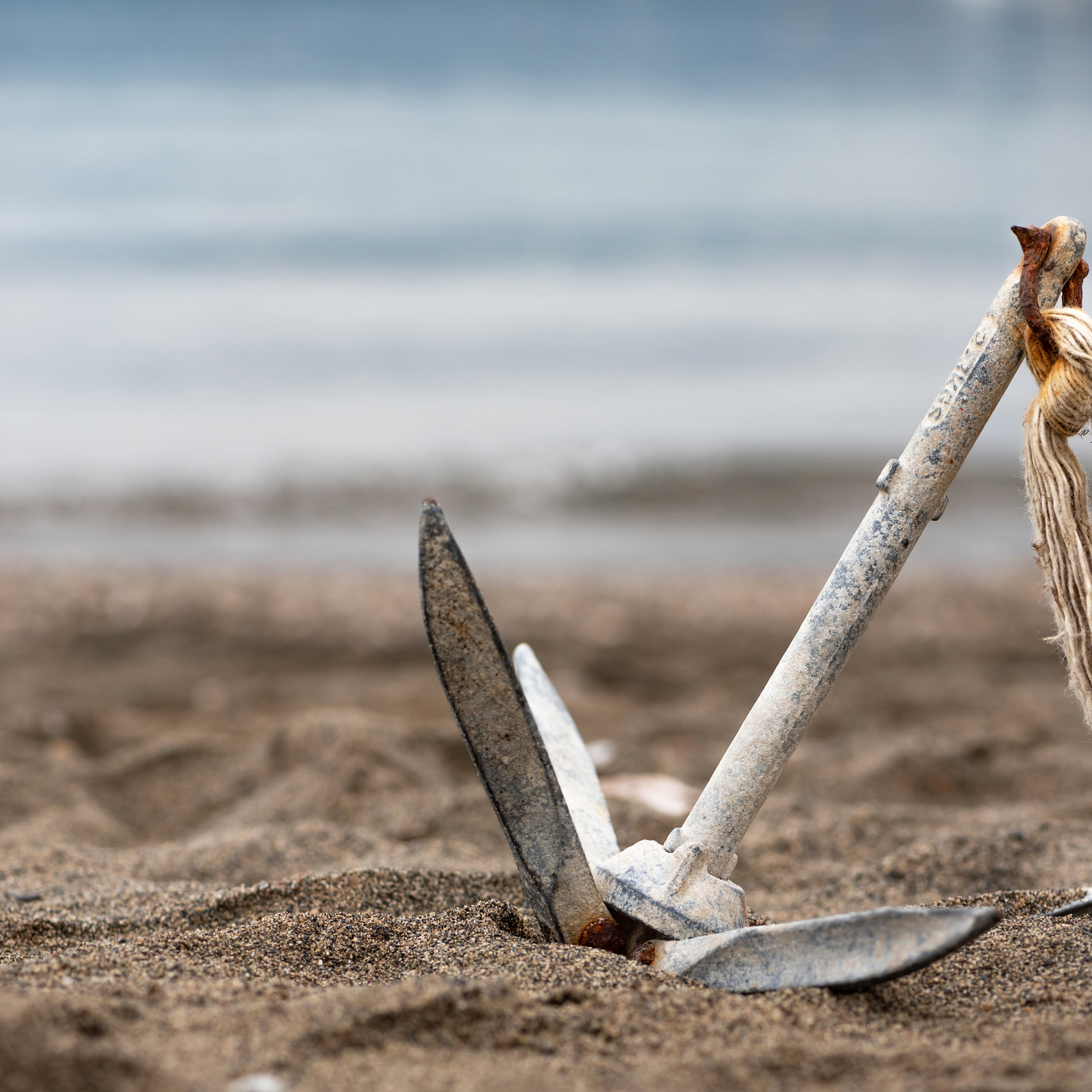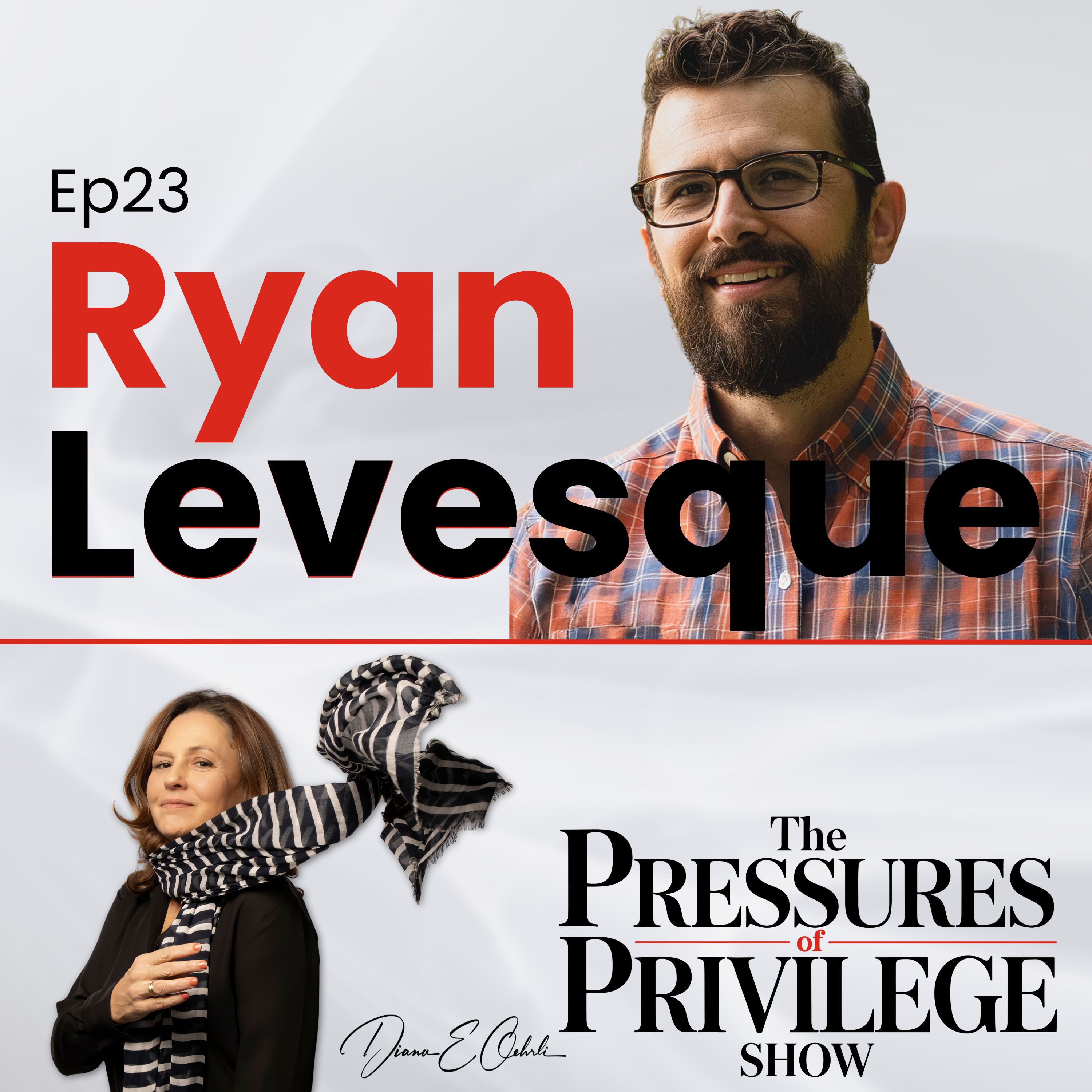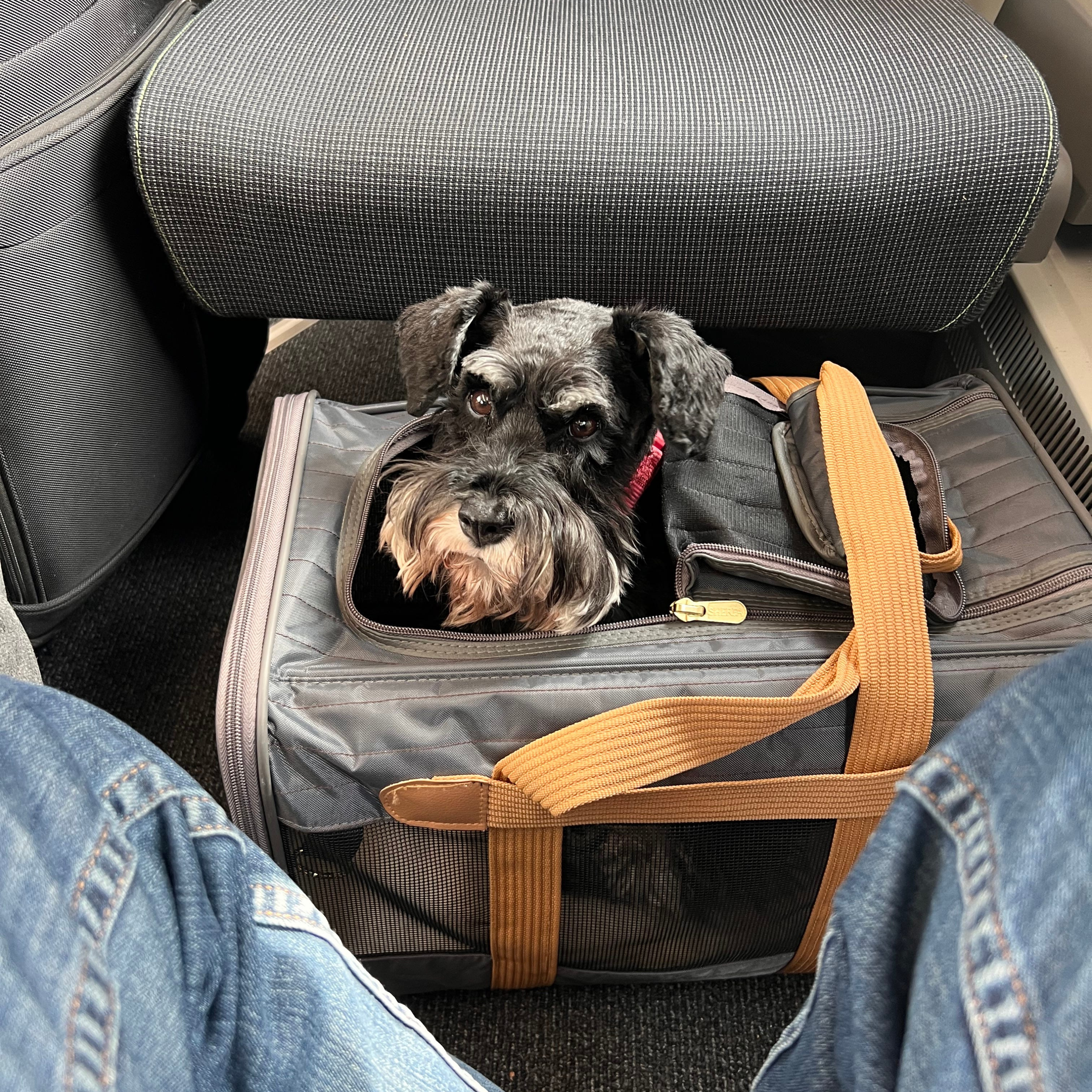Episode Transcript
[00:00:10] Diana: Welcome to today's episode. I'm excited to share a conversation with someone who's been more than just a friend to me. She's been a lifeline. Meet Marissa Stalder. She lives in the Swiss Alps, working as a house manager for wealthy clients in Gstad. But Marissa is from northern Spain, and she carries that warmth with her everywhere she goes. This is someone who pulled me out of a dark moment, literally. She's an artist who creates paintings, pillows, and handbags. She's a deep thinker who's traveled from Louise Hay to the Secret, from Deepak Chopra to Joe Dispenza. She's passionate about meditation and consciousness. Most of all, she's on a search for purpose. We talk about resistance and how it stops us from taking good action. We share how we've pulled each other out of dark spaces over the years. She's charismatic, she's creative, and she has some beautiful insights about how our awareness shapes everything we do. So let's dive into my conversation with Marissa, recorded from my home in the Swiss Alps.
[00:01:06] Diana: I remember seeing you with girlfriends, like when we get together for picnics.
[00:01:10] Marisa: Yes.
[00:01:10] Diana: And you were talking about positive psychology. You were talking about the secret.
[00:01:15] Marisa: Ah, probably.
[00:01:16] Diana: I remember that.
[00:01:17] Marisa: Yes, yes, yes, yes.
[00:01:19] Diana: And I remember paying attention to you then because I noticed that you had this desire for inner growth, even back then. And that was like 20 years.
[00:01:27] Marisa: All my life. All my life. The first, when I was living in London, I had Louis Hay.
[00:01:32] Diana: Oh.
[00:01:32] Marisa: And that was my book that followed me everywhere. So that was. And I was 23.
[00:01:40] Diana: What was it about, that book?
[00:01:41] Marisa: It's about how to.
Thinking.
[00:01:44] Diana: Yeah.
[00:01:45] Marisa: And how it helps to change your reality and how it. In the way we think, interact in our health. Because if you are all the time programming yourself in a bad way that has a reflection in your cellulus and in your body.
And I say the conversation that you've got about yourself, about the things where you put your attention, you end up creating in you something that end up staying an illness.
And we don't realize how powerful we are.
[00:02:31] Diana: Wow.
[00:02:31] Marisa: With our thinking and with our doing, with our everything.
[00:02:35] Diana: So you knew this when I met you 20 years ago.
[00:02:38] Marisa: Yes. But I was doing. I was putting it in practice, but not as conscious as I'm doing it right now. I mean, since I started doing meditation five and a half years ago, then is when I really put all of me into it. I really make up a decision.
Because changes doesn't come until you make up your mind that you want to do it. You can Have a lot of knowledge. But if you don't integrate that knowledge by making decisions is the only way you make a decision. You want to stop eating, you want to stop thinking this way. You want to. You want to stop judging, you want to stop comparing, you want to stop sending bad messages to yourself. It doesn't happen until you make a decision. I want to stop smoking. I want to stop whatever thing that you think is unhealthy in your life. Behaviors of thinking, bad relationships are all decisions. Bad jobs that we've got in our lives are all decisions that you are making in your life that are going to change the direction. If you don't like the direction that you are going right now, just change.
[00:03:46] Diana: Be aware and so your meditation practice has helped everything happen?
[00:03:51] Marisa: Yes, it helps me to be present and be aware of my thinking, of my behavior. Because in meditation you have to be present and it's a muscle that you train. So more you training more in the awakening moments of your life.
That is the rest of the hours you are aware of what is going on in your life and stop the waste that doesn't align with the way you want to think. You stop them. That is what where meditation comes because you are practicing that. So it's when you are in meditation you cannot engage with your thoughts. Doesn't mean you don't have thoughts. It's impossible. But don't engage with them. And more you come to the present moment.
So more you come into your daily living into the present and more aware you are of those those thoughts. More transformative is your life.
[00:04:45] Diana: Wow. I felt this energy from you when I first met you. And you hadn't even begun meditating yet.
[00:04:50] Marisa: Yeah.
[00:04:50] Diana: And then we had this sort of dark night of the soul moment or I did and you pulled me out of it. Do you remember that time when I drove by your village at a Snowstorm back in 2012?
It was February. Drove through your village of Alber and I.
I remind. I remembered I knew you lived in that village. I drove by and I was crying and it was a snowstorm. My windshield wipers didn't work because they were frozen because I hadn't filled the windshield windshield wiper fluid and everything in.
[00:05:22] Marisa: My house was not working either.
[00:05:24] Diana: And I called you and. And I told you I wanted to die. You remember that?
[00:05:28] Marisa: Yeah, I do.
[00:05:29] Diana: And I remember. Do you remember what you told me?
[00:05:31] Marisa: No, I don't remember exactly what I told you, but that you are worthy. That that's.
[00:05:35] Diana: Yeah, because I remember. I remember. I remember telling you that I didn't think I was worth living.
[00:05:41] Marisa: I remember saying that is when we give our power away. You see what happens to us?
[00:05:46] Diana: Yeah.
[00:05:47] Marisa: In anything. We give our power away, then we get empty.
[00:05:51] Diana: Yeah.
[00:05:51] Marisa: We are expecting and creating in our mind instead of creating for you. You don't need anybody to be happy. You need to be happy yourself and share that happiness that you create in you with somebody. Not somebody that helps you to create that happiness. No, that's wrong.
[00:06:08] Diana: Yeah.
[00:06:09] Marisa: Because then you will have expectations on the other. So they done and they suffer. Yeah. You don't expect from anybody. You create yourself.
[00:06:17] Diana: But in that moment, you didn't lecture. You didn't lecture me. You said to me, diana, your kids love you. The boyfriend who just dumped you is a silly goose or some. Something. He's a silly man.
[00:06:28] Marisa: Whatever. He came to me and you just.
[00:06:32] Diana: Pulled me out of this. Like you just.
You didn't pull me out. You gave me a ladder. You were like the charismatic adult in my life who just gave me like a rope to climb out of my hall, is what you did.
[00:06:44] Marisa: How beautiful, right?
[00:06:45] Diana: Yeah. That's what you gave me. I always thought you were like one of those angels that gave me that ladder that way out. Yeah. Oh, I can see you're getting teared up.
And I'm so grateful for that moment because, you know, I did stop. I got windshield wiper fluid and. And I was driving to a writer's workshop in Geneva and remember?
[00:07:09] Marisa: Yeah.
[00:07:09] Diana: And. And that turned out to be a wonderful turning point as well. The whole writing work site.
[00:07:14] Marisa: Yeah.
[00:07:14] Diana: Or the going there is I put my kids in boarding and it was a snowstorm and it was just really, really awful moment. I've actually written about it in my memoir.
[00:07:24] Marisa: I know.
[00:07:24] Diana: And. And then after that, I remember you and I, our friendship got even deeper and used to come to my house and help organize my house, Help me let go of stuff.
[00:07:34] Marisa: Let go, go, let go. But that's life. That's exactly the way we are.
[00:07:39] Diana: Let go.
[00:07:40] Marisa: Don't call them to beliefs, to things that should be this way. And all this program that we are in. So it's all about letting go. More you let go, more free you become. And then it's when you have everything.
[00:07:54] Diana: I remember you helped me declutter. And I remember I would hold an object that belonged to a grandparent or somebody, but it was probably a really ugly thing or an ugly piece of furniture. And you said, Diana, do you love this?
[00:08:06] Marisa: No.
[00:08:06] Diana: But I feel like I need to keep it because it reminds me of my grandparent. And. And you're like, do you. But do you love this object? And I was like, no, not really. Then you're like, goodbye. You remember?
[00:08:17] Marisa: But it's the way it goes. Right? That's the way I deal with things in my life as well. So that is why I share that with you in that moment. Because when you've got things in your life that they don't serve you, what further you need them to accumulate? To what? To nothing. To nothing. Do nothing. To occupy the space.
[00:08:39] Diana: Baby made me my little pillow that says goodbye on it.
[00:08:43] Marisa: I do.
[00:08:44] Diana: It's so hard to let go.
[00:08:46] Marisa: It's one of the hardest part. Diana, for example, you had a heart. Imagine when people have hard experiences in life. To be able to understand that experience and let it go and become free is a big challenge that we need help sometimes from each other and from people. That really helps you to let it go. Right?
[00:09:07] Diana: Yeah.
[00:09:08] Marisa: That is why we've got so many experts in the world that can help you to let it go.
[00:09:15] Diana: Yeah.
[00:09:15] Marisa: So what?
[00:09:16] Diana: Even there, you were a huge help to me. And that was before you even started meditating. But it was around the time you started your meditation practice. Do you remember what led to you all of a sudden going from not meditating to all of a sudden meditating daily?
[00:09:29] Marisa: I was not. I was feeling a hole inside of me.
[00:09:33] Diana: Really?
[00:09:34] Marisa: Yeah. I was like, this is all.
[00:09:36] Diana: This is it.
[00:09:37] Marisa: This is it.
[00:09:38] Diana: This is what life's all about.
[00:09:39] Marisa: Yeah. It's like I'm getting tired.
[00:09:42] Diana: Tired?
[00:09:43] Marisa: Yeah. I don't want to. What is this? This is what? Go to work and home, cook. Fight if I need to fight. No. Fight if I don't need to fight. Compare. No, compare. Bad news, good news. But it was something deep in me that was telling me, like, there's something else all my life. But suddenly I had a friend that was going through a big anxious attacks for 14 years.
And she was in pain. And I thought, you know what? I am in pain too.
So let's go ahead, let's get out of here. What do we need to do? Make changes.
Meditation came along and I start with Deepak Chopra. You send me.
[00:10:31] Diana: Oh, yes, the 21 day chapter. Yeah.
[00:10:33] Marisa: It was you that 21 days. And I said, yeah, come on, let's do it. Look, I forgot that part.
I start doing this 15 minutes every day. And I was like, oh, my God, it feels good. And I make the decision. It was like something that helped me. Like when you stop drinking or you stop smoking. That was one Moment in my life that I make up my mind.
And I.
[00:10:57] Diana: But there was also a woman in your village who did workshops.
[00:11:01] Marisa: Yeah, but it was like once a month with a full moon. And we used to sing home for 45 minutes.
[00:11:10] Diana: And you would sing and hum for 45 minutes. But didn't that help you deepen your practice or was that just extra?
[00:11:15] Marisa: You know, nobody explained me that when you've got thoughts. I didn't know anything about meditation, so it was always searching in Internet and goog, how do you meditate? And blah, blah, blah. And that's the way I learned. And after I went to a workshop of Joe Dispenza, I read all his books. I really read all his listen, all his podcasts. And I went into it so full that I.
I start changing my life. Yeah.
[00:11:44] Diana: And I remember when you were in that Joe Dispenza phase of your seeking, let's pull it, let's say. Or you had just finished reading his books.
[00:11:52] Marisa: I wanted everybody to know about it. And then I realized there's nothing this for you, Marisa. It's not for the others, but it is. Yeah.
[00:12:00] Diana: Remember I was having a tough time with my daughter.
[00:12:03] Marisa: Yeah.
[00:12:03] Diana: And I was really cut off from the loving, the love that I actually had for her that you had. But I was in such fear that I didn't feel the love anymore. And you had me listen to his meditation, the love meditation, 15 minutes every day.
[00:12:19] Marisa: Yeah. Yeah.
[00:12:19] Diana: And I did what you said.
[00:12:21] Marisa: Yeah.
[00:12:22] Diana: And that really helped. It really, really helped. Because I remember at one point just bursting into tears listening to that thing.
[00:12:28] Marisa: Beautiful. Yeah. It's because that tears are inside of you.
[00:12:31] Diana: It's amazing because that's, that's one of my struggles right now, you know, because I'm. I'm in a program with alcohol. There are alcoholics. And you know, we. Meditation is a part of our program, but our biggest problem is our self centered fear. And when that takes over, the love gets covered up.
[00:12:49] Marisa: Right now we are in a planet, in a point where is love or light and fear or war, whatever you call it, this fear war thing is trying to control the planet. And this light consciousness, love is becoming conscious of the way this fear works. So they said that we will go through a big washing machine, wash all of us. That includes a lot of crazy stuff that nobody knows. But this part of consciousness, love, light will become the winner. Because we are more and more and more every day in the planet, thank God, that we realize how programmed, limited, unconscious, we live this life. And what is really our purpose of living this life. People are starting to question themselves, questions that they never questioned before. And that's so important because we are in a automatic pilot. No time to question. What am I doing here? Money, stress, work. Addictions. Addictions. To criticize yourself, to criticize the others, to compare, to become one part. You don't have to choose right or left or center. You have to be.
[00:14:06] Diana: That's beautiful. Yeah, it's really beautiful.
[00:14:08] Marisa: It is, Diana. Really is.
[00:14:10] Diana: So you're. You have actually a very positive message that. Because people are becoming more conscious.
[00:14:15] Marisa: Yeah. It's a lot about consciousness and peace in you. Be in peace. That's the message right now. More in peace. You are in this whole washing machine project that they have for us because it's all a program that they know.
[00:14:31] Diana: How to do that, how to get us all through.
[00:14:33] Marisa: So I'm saying this about the fear that you are talking before.
[00:14:37] Diana: Right.
[00:14:37] Marisa: Fear is the one that is keeping us linked in.
[00:14:40] Diana: Yeah.
[00:14:42] Marisa: Stuck. Scared about money, about this and more free. You are.
[00:14:46] Diana: Yeah.
[00:14:46] Marisa: Then you realize that you've got everything. You are always in the right with the right. You're always. It's the other way around. All the other way around. That is why knowledge is so important, Diana. Because more knowledge you have and you practice it, obviously you integrate in you more fit you become.
That's the message I will send to the people.
[00:15:09] Diana: Yeah. Because what triggered our conversation today was I was complaining with you that I was out of integrity because I hadn't been doing my piano practice and you challenged me on my resistance and on my thinking.
[00:15:22] Marisa: Yeah. But it's right. You realize. It is.
[00:15:25] Diana: Yeah. I had forgotten. I mean, I've read the War of Art.
Wonderful book, by the way. I read it 10 years ago and I know about resistance to art. But then I forget about it in my daily life and I let my excuses and my thoughts get in the way of what I really want to do.
It's amazing. Thank you.
[00:15:45] Marisa: All my life. You remember when you were doing all this coach that you needed people to train. Yeah. And I remember sitting in my bed crying and telling to yourself, you ask me, what is the thing that you most loved in life? And I said to you. Laughing. Yeah, laughing. Because you can travel. You can. But laughing put my frequency so high. So high that I am. I like, release all my tension.
Have a good time after laughing. My frequency is high.
Yeah. It's all good about laughing. And I was. And you were telling me, and what's the. Why you are doing all this coaching Stuff. And I said, because my self autism is so low that I don't believe in me. Because I surrender to the belief that I was not worthy after listening to it so many years on top of me, allowing that thought to drain me, to believe they are right. They are right. Even if deep inside of me there was something telling me, don't believe that, baby. But I was trying to get out and I. It was like so scary. Like to me, talking in this microphone right now. Yeah. It's like, wow, it's the first time you're doing this.
[00:17:03] Diana: Yeah.
[00:17:03] Marisa: So whatever.
[00:17:04] Diana: Well, I know you're a very loving, giving person, so whoever's listening is benefiting from you too. You. I benefit from listening to you.
[00:17:10] Marisa: Perfect.
[00:17:11] Diana: So, if you're helping another human.
[00:17:13] Marisa: Being, that would be the best thing ever.
[00:17:16] Diana: Well, it's. Yeah, you need to get going and go shopping. So this is life in the Swiss Alps. Maurice is from Spain, but she's become very Swiss. Right?
[00:17:26] Marisa: I don't know, but I like Switzerland. It's a paradise. Every morning when I wake up in these mountains, I said how grateful I am to have the chance that my eyes can see this beauty of the natural and how life put me here in this part of the planet, in this paradise. Why, I don't know. But I have to enjoy it and I have to be grateful for it, because there are other parts in the planet that are the opposite.
[00:17:52] Diana: Now, I have to ask you a quick question, because this podcast has a theme of privilege, the pressures of privilege, which is, you know, about. It's not just about wealth. It's about having, you know, special advantages in life. But you work with a certain clientele here in. In the mountains that has a certain level of wealth and privilege, and you see them afraid, front and personal, because you were part of their staff. But do you. What can you conclude? Do you think money makes you happy?
[00:18:19] Marisa: Not at all. Money it is. Money gives you a freedom in the material world. It gives you freedom to help people. It gives you. Yeah, it's such a good thing you can do. Money is good. Money is good, Ariana. Money is freedom. That is what I believe. Freedom. You can help. You can do whatever you want, whenever you want, as long as you want. So what a poor wants that. Everybody wants that energy in your life. I want to have that possibility.
[00:18:48] Diana: So what are some of the pitfalls of wealth?
[00:18:50] Marisa: But it doesn't balance your brain, it doesn't balance your values in life. You are not more than anybody because of having more or less the Opposite. I mean, when you start thinking that way, you are unbalanced. You frequency and not at all. Diana, money also makes you scared. When you've got a lot of people thinking that they are with you because of your money and you have to be under control of your properties, of your money. And poof. What a job. What a job. What a pain. Why don't you share a little bit of what you have? You still are happy and free and able to do what you want and share that with more people.
[00:19:36] Diana: So why do you think some of the people we see here and this was in Gstaad, you know, why aren't they happy?
[00:19:43] Marisa: They pretend. What, you mean the rich people?
[00:19:46] Diana: Yeah. Why aren't they happy?
[00:19:48] Marisa: This a game. This place in concrete is a game of worth. That is what I see. I mean, it's a lot of people. Yeah. A lot of competitivity. Who has the best party, who has the best flowers, who has the best dress, who shops more, who. Who is the best? Sharing with charities, who is the best. It's all ego game is to feel your ego. When you do something with the heart, you don't share. You don't have that need. Even if you are rich, you don't have that need. You do it because you do it. You don't need approval from the others to post it in Facebook or to make an article in the newspaper. I did this. That's ego. You do it in silence. You don't need anybody to recognize you how good you are. When you do the good things for the recognition you have ego, it's not from your heart. That's not real.
[00:20:39] Diana: Yeah, I've spoken to some property managers of some pretty big chalets here in Gstaad. And they've told me that their bosses are the most miserable people they've ever seen. And they're billionaires.
[00:20:49] Marisa: Yeah, they are unhappy people. They put all their focus on the material world and they forgot the important thing that you are. You are heart, you are loved, you are. That's all you are. Your essence is gone. It's not space for. For you. So you end up shopping, stream traveling, doing all in stream. We are all addicted, Diana. It's not only alcohol, it's not only drugs. We are addicted to yachting, to comparing ourselves to having. That's addiction. And it's as hard to stop yachting yourself as it is to stop drinking. So it's all addiction. The moment that you reach to that which is your addiction and you decide you want to change, this is the.
[00:21:37] Diana: Miracle So I have a lot of clients who judge themselves.
[00:21:40] Marisa: And me, I look in the mirror, I say, what a fellow is. What a.
[00:21:45] Diana: You know, so how do we stop that?
[00:21:47] Marisa: Be conscious. The minute you are conscious, I say, oh, come on. This is the program again. Telling me not to play the piano because my fingers hasn't been training for three months, three years.
That's the program that we have become aware.
[00:22:02] Diana: Oh, my God, Marisa, you're amazing.
[00:22:04] Marisa: Tak. Tak. Aware. Boom. Tame. Boom. Boom. Boom. Boom.
[00:22:08] Diana: So you talked about that time when you were in bed crying and you felt you weren't good enough. And that really your dark night of the soul moment. Oh, and you know, and you talked also about your vibration.
[00:22:20] Marisa: How to change the program that I.
[00:22:22] Diana: Go from bed to feeling laughter.
[00:22:24] Marisa: Going into your subconscious mind and changing that program. What meditation is all about as well. There are a lot of kinds of meditation, but especially this one that I go with, Dr. Joe Dispenza. He goes to the subconscious mind.
And then you go to a state in your brain while you are in meditation that you reach where you can change that program is like a hypnosis kind of way.
That is the only way. I mean, you cannot change a program that you've got here if you don't go to that program. And you create that program when you were a kid. And you have to go to the mind of that kid in that moment to become the person that you want and to make the change.
[00:23:11] Diana: Yeah, but how do you get there? Can you talk meditation?
Can you talk through how you do your meditation?
[00:23:17] Marisa: Well, I go into my meditation. Breathing is very important because. Helps you to synchronize your system.
[00:23:27] Diana: Or you're parasympathetic.
[00:23:30] Marisa: Exactly. So you have to put it in the right place. So you become nobody. No one, no time, nothing. And in that emptiness in that space, there is nothing. Instead energy.
And you feel energy. You extract yourself from your physical body and you become that energy. Is a practice, but when you get there is when you can reprogram your brain by sending messages of which transformations you want to make in your life.
[00:24:04] Diana: So how do you start the whole meditation practice? Do you do it in bed? Do you do it on a chair?
[00:24:09] Marisa: Sitting down? Sitting down in a chair, alone in a quiet place. I put my meditations from Joe Dispenza. They are already well studied. The music they use, the words they use. It's important. The word that you put in your brain, how it affects one word or another. And he has such a. An impact in the planet.
[00:24:31] Diana: Do you ever Meditate without him.
[00:24:33] Marisa: Yes. After so many years, I did silence, I did other people. And yes, yes, I did a lot of kind of things. Different ones. Because not all the meditations are for everybody. You have to try and see what it works for you.
[00:24:47] Diana: Right.
[00:24:47] Marisa: Because not everybody's the same.
[00:24:49] Diana: What's your favorite?
[00:24:49] Marisa: Me, I like it. It depends on the moment of my life.
If you want to activate your pineal gland to have a really high connection for one hour, you connect into the breathing and you make a special breathing that they teach you. It's very powerful. I mean, that is very powerful.
You can have downloads in your meditations.
[00:25:16] Diana: Real downloads or like.
[00:25:18] Marisa: Yeah, really Downloads, I mean.
[00:25:19] Diana: Or downloads in your brain, you mean.
[00:25:20] Marisa: No, no, of course you change by doing meditation. The architecture of your brain.
[00:25:26] Diana: So what is it?
[00:25:27] Marisa: What is download? You really go to another.
You leave that energy to bring. So myself in the meditation, where an image opens so clear and so big, that's more real than what I see with my eyes right here, right now.
[00:25:44] Diana: Wow.
[00:25:44] Marisa: In meditation.
[00:25:45] Diana: So that's a download. When you have a vision or a.
[00:25:48] Marisa: Vision or something that comes and a message.
[00:25:54] Diana: A message, wow.
[00:25:55] Marisa: I mean, it's difficult to explain.
[00:25:57] Diana: How does meditation then help you in your daily life when you're like, let's say it's stuck in traffic or some jerk cuts you off.
[00:26:03] Marisa: I am really like here, looking in my mirror, don't even need to be in the traffic. And I catch myself talking badly in my mind about something of focusing things I don't like and sending bad energy to somebody that suddenly something, my energy doesn't connect. Whatever I do that it doesn't put my vibration high, I catch myself immediately.
[00:26:24] Diana: Oh, so it's all about vibration.
[00:26:25] Marisa: We are energy. That's what I believe.
[00:26:27] Diana: Are you familiar with the David Hawkins scale? There's a scale of different waves of energy that we emit. And that courage is the boundary between lower levels of energy and higher levels of energy. And I've always been very interested in the idea of get to cour. And then everything is downhill from there. Like, if you can get to courage, then all of the sort of brighter waves of energy are easier to access once you get to courage.
[00:26:53] Marisa: But how do you get to courage?
[00:26:54] Diana: That's what I wanted to ask you.
[00:26:56] Marisa: You get to courage by practicing courage. You get to freedom by practicing freedom. You get to love by practicing love. When. When you're in meditation. Yeah, that is where I practice these kind of things. Happiness, love, freedom. And in real time, so more you practice that you more become that person. So how do courage you go into your heart. You are in meditation deep inside of that space. No one, nothing, nowhere. And you feel in your heart and by crying a lot, my dear, what is courage for you? And there you see how limited you are, how much shadow you have inside of you. And then when you at me, at least I spent three or four years crying every single day.
[00:27:42] Diana: Really?
[00:27:43] Marisa: Oh, wow. My God.
[00:27:44] Diana: You're making my trauma workshops seem like nothing.
[00:27:47] Marisa: You have to by talking to you. I feel it.
How do I feel I am worthy? No, that's the question. How I feel. I am happy to a person that is sitting in the street and has lost two kids last week. Going to your heart, understanding that we are not this physical body. We are much more powerful that we've been told.
[00:28:09] Diana: I think this is a really good moment to end it.
[00:28:11] Marisa: Yeah.
[00:28:13] Diana: Thank you.
[00:28:13] Marisa: We did it.
[00:28:14] Diana: Yeah, we did. Before we wrap up, I'd like to.
[00:28:17] Speaker D: Thank Oliver Kuiker for the jingle and Gwendolyn Christian for the backup support.
Also, a quick reminder, these interviews are not a substitute for professional medical, legal, or psychological advice.
Always consult with a qualified professional for any major decisions in your life.
And thanks for joining me in exploring the connections that make us human and learning insights and strategies to help us build, heal, and nurture relationships, including and especially the the one with yourself. It's been an honor to share this time with you and to bring you conversations with some of the brightest minds who deserve more recognition. Remember, life's too short to take too seriously. So don't forget to hit that subscribe button, get outside, and let's continue this journey of life together.
See you next time.
